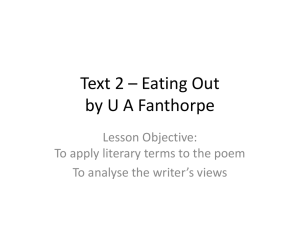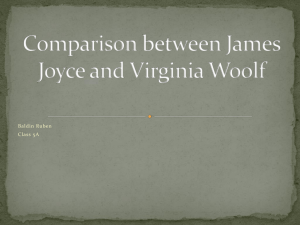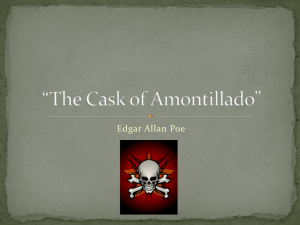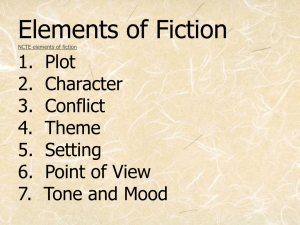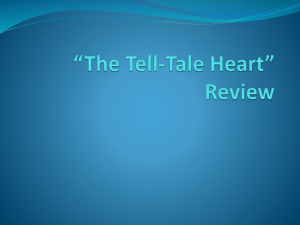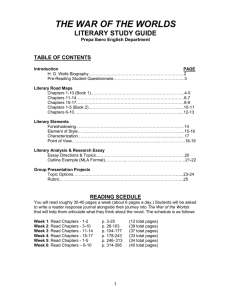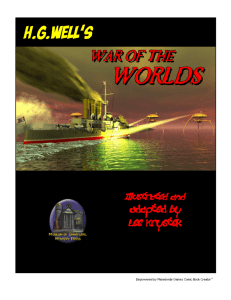War of the Worlds Discussion Questions
advertisement
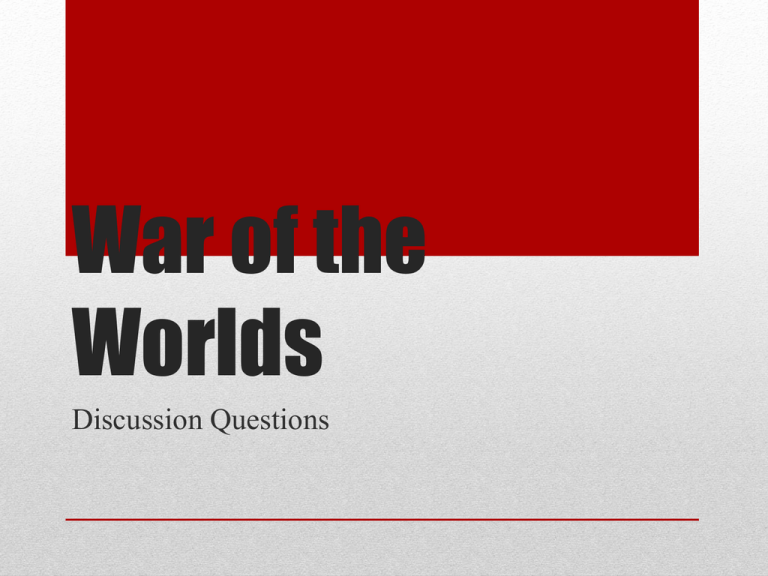
War of the Worlds Discussion Questions • Briefly describe the physical appearance of the Martians. • Find a passage from chapter 4 that displays or refutes (argues against) the critique that Welles portrayed human nature in a pessimistic fashion. • In what ways is the presentation of the heat-ray technology believable to the reader? Chapters 4-8 • “So some respectable dodo in the Mauritius might have lorded it in his nest, and discussed the arrival of that shipful of pitiless sailors in want of animal food. ‘We will peck them to death to-morrow, my dear?’” • In what ways does this passage demonstrate man’s arrogance? • How can this passage be considered an example of foreshadowing? • How is this a metaphor for the Martian invasion? Chapters 4-8 • What happens to prompt the narrator to move his wife to Leatherhead? • What two things does the narrator do that seems selfish? • What is the narrator eager to return to Maybury? • Briefly describe the “Thing” the narrator observes coming across the landscape. Be sure to include how it looks, moves, and sounds. Chapters 9-11 • What does the following passage suggest about the author’s opinion of mankind’s behavior toward less intelligent life on Earth? • “I began to compare the things to human machines, to ask myself for the first time in my life how an iron clad or a steam engine would seem to an intelligent lower animal.” Chapter 11 • Wells often includes social commentaries in his novels. Find a passage in this chapter that expresses his opinion on the impact new and more advanced technologies might have on the way wars are fought in the future. Chapter 11 • Cite incidents from the chapter to support or refute the following statement: The death of one of the Martians is a good sign, giving the humans hope that they may eventually win the war. • What evidence is there that the Martians have emotions and care about each other? Chapters 12-14 • What evidence is there that the Martians learned something from the death of their comrade? Why do you think they retreated back to the pit? • Support or refute the following statement by citing incidents from the chapter: Wells does not believe that natural disasters occur because humanity has somehow offended God. Chapters 12-14 • What do you think is the author’s opinion of Londoners as described in the following passage? • “’The majority of people in London do not read Sunday papers.’ The habit of personal security, moreover, is so deeply fixed in the Londoner’s mind, and startling intelligence so much a matter of course in the papers, that they could read without any personal tremors.” Chapters 12-14 • What is the question uppermost in the narrator’s mind as he watches the Martians advance? • Wells is renowned for his predicting weapons of the future. What kind of warfare does he predict in this chapter that became a reality in World War I? Chapters 15-16 • What human attribute is illustrated by the “bearded, eagle-faced man”? Why do you think Wells includes the plight of Lord Garrick? Chapters 15-16 • What does the narrator think the Martians are trying to accomplish with their attack on London? • How many of the ten cylinders have fallen by Tuesday night? What is the Thunder Child? • What does the last line in the paragraph imply about the purpose of the flat, broad thing flying overhead? Chapter 17 • Why does the narrator lock himself in a room at the top of the house. • In the following passage, what is implied about the reason the Martians are capturing humans? • “…in a moment it was evident this Martian pursued them…he used no Heat-Ray to destroy them, but picked them up one by one. Apparently he tossed them into the great metallic carrier which projected behind him.” Book 2 chapters 1-2 • What refinements does the narrator add to his earlier descriptions of the Martians? How do they eat and reproduce? • How does these physical differences contribute to the cold-blooded behavior of the Martians on Earth? Chapters 1-2 • What do the Martians wear instead of clothing? What ancient development of man is totally absent in the science of the Martians? • List at least two differences between life on Earth and life on Mars. Chapters 1-2 • How does the forced confinement magnify the difference between the curate and the narrator? • Why does the narrator stop spying on the Martians through the hole in the wall? • What efforts does the narrator make to escape the house? Why does he quit trying? Chapter 3 • Why does the narrator hit the curate over the head with an ax? • The suspense and drama in this chapter reads like a scene in a horror movie. List three ways Wells maintains the reader’s suspense throughout the chapter. Chapter 4 • Why does the narrator believe it is safe to move the red weeds away from the hole so he can look into the pit? • What does the countryside look like after the narrator leaves the safety of the house? Chapter 5 • Why does the narrator experience a feeling of “dethronement?” • How does the red weed die? In what way is the death of the red weed a sign of hope? Chapter 6 • What is one thing the narrator hopes mankind learns from this war? • What is potentially dangerous about the artillery man’s statements that men will go on living “for the sake of the breed” and that the new group does not need anyone who is “weak or silly?” • Why does the narrator decide to leave the artillery man and try to get to London? Chapter 7 • Define temerity. How does the narrator feel walking through the deserted city? Why does he miss the sound of “Ulla, ulla, ulla”? What do you think is making that noise? • What finally kills the Martians? What is ironic about their death? Chapter 8 • Why does the narrator believe the humans have earned the right to continue living on the Earth? • How do you feel about the death of the Martians? Chapter 8 • What was the narrator writing about before the Martians came? How is the topic of his paper an example of irony? Chapter 9 • Why does the narrator believe another attack from Mars is possible? What does he suggest the people of Earth do if the Martians send more cylinders to Earth? • In what was does the narrator think mankind can benefit from the experience of the Martian invasion? Chapter 10 • Support or refute this statement by citing evidence from the story: Despite the numerous examples of poor behavior by the humans while under attack by the Martians, this story ends with hope for the future. Chapter 10




